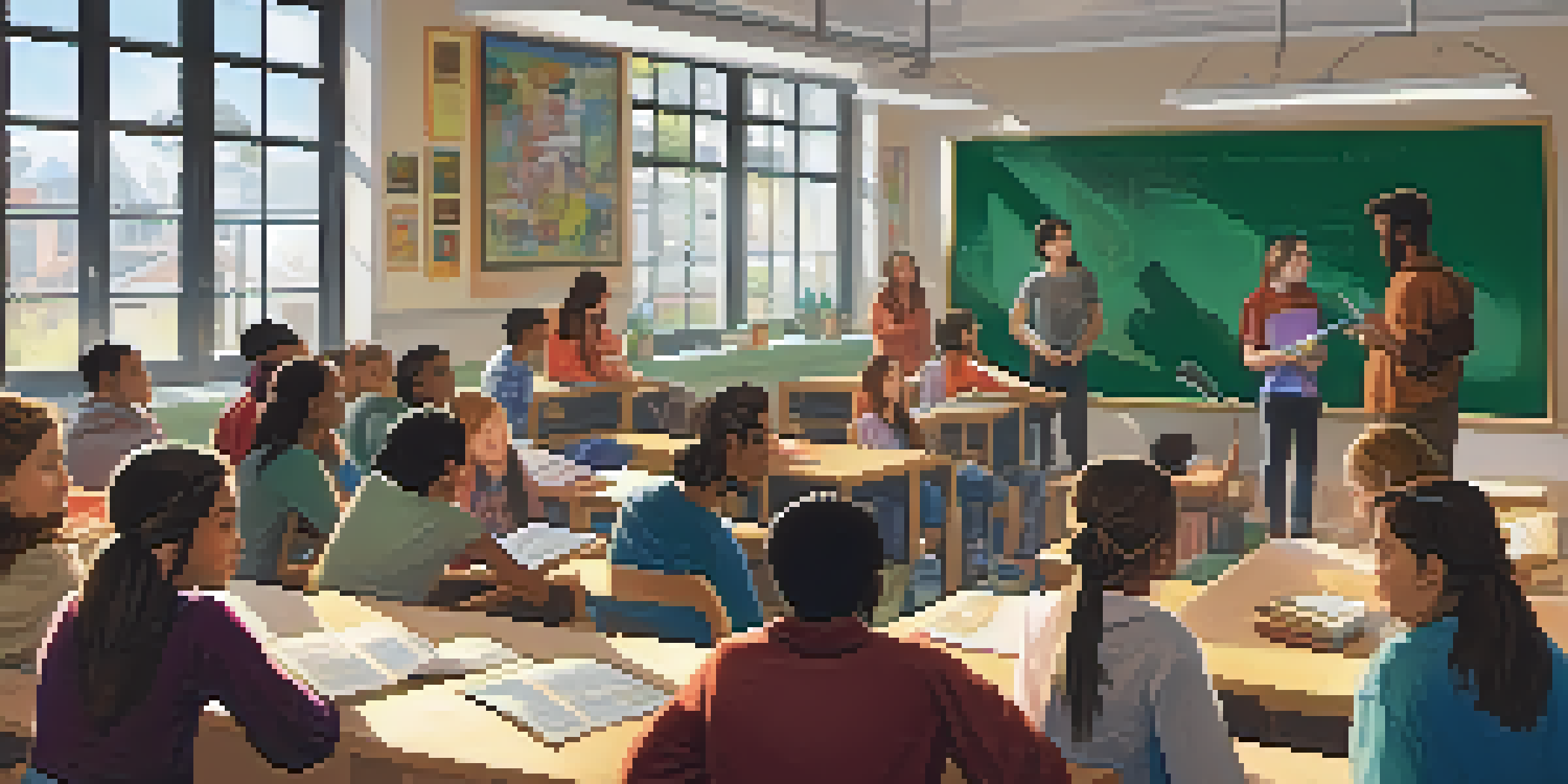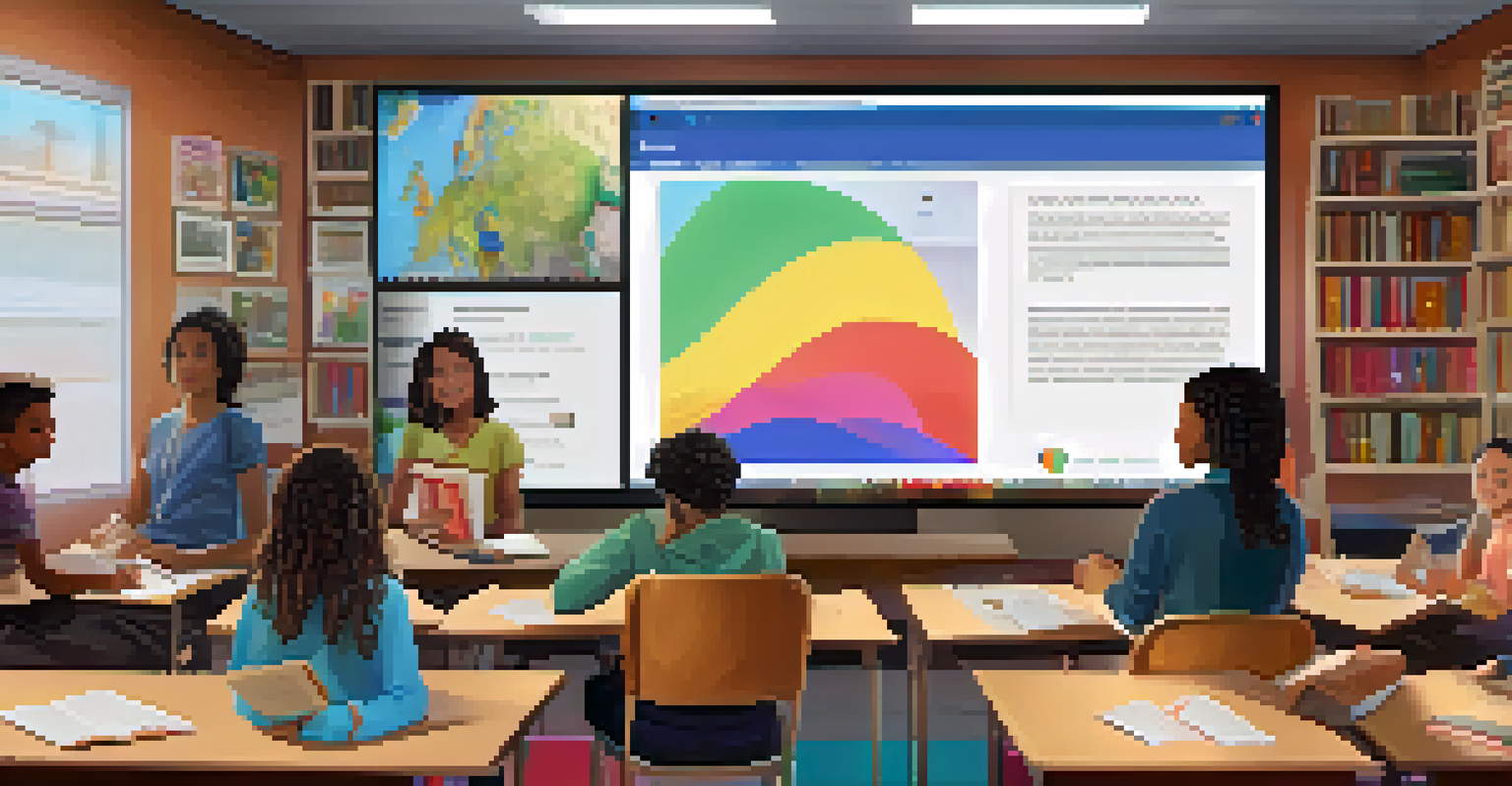The Value of Literary Discussions in Learning Environments

Enhancing Critical Thinking Through Literary Conversations
Literary discussions encourage students to analyze texts deeply, honing their critical thinking skills. When students engage with literature, they learn to question characters' motivations, themes, and underlying messages. This analytical approach translates into improved problem-solving abilities in real-world scenarios.
Literature is a way of life. It shapes our thoughts and influences our actions.
For example, discussing a novel's conflict may prompt students to explore different perspectives, helping them understand complex issues. By examining various interpretations, they become more adept at forming their own arguments and defending them. This skill is invaluable, as it fosters independent thinking that extends beyond the classroom.
Moreover, these discussions nurture a sense of curiosity, pushing students to seek out more diverse literature. This not only broadens their understanding of the world but also equips them with the tools to navigate complex societal issues. In essence, literary conversations are a gateway to developing critical thinkers prepared to tackle challenges head-on.
Fostering Collaboration and Communication Skills
Participating in literary discussions promotes collaboration among students, building stronger communication skills. When students share their thoughts and listen to differing viewpoints, they learn to articulate their ideas clearly and respectfully. This collaborative environment is crucial for developing interpersonal skills that will benefit them in future endeavors.

For instance, a group project centered around a book can lead to lively debates and shared discoveries. As students navigate these discussions, they learn the art of compromise and negotiation, essential traits for any team dynamic. Such experiences help cultivate a supportive classroom atmosphere, where everyone feels valued and heard.
Boosting Critical Thinking Skills
Literary discussions encourage students to analyze texts deeply, enhancing their ability to think critically and solve problems.
Ultimately, the ability to communicate effectively is a cornerstone of success in both academic and professional settings. By engaging in literary discussions, students not only enhance their understanding of literature but also prepare themselves for collaborative environments they will encounter throughout their lives.
Building Empathy Through Diverse Literary Perspectives
Literature offers a unique window into different cultures and experiences, allowing students to cultivate empathy. Through discussions centered around diverse narratives, students can explore lives vastly different from their own, fostering a deeper understanding of human experiences. This exposure is crucial in today’s interconnected world.
The greatest gift is a passion for reading. It is cheap, it consoles, it distracts, it entertains, and it gives you knowledge of the world and experience of a wide kind.
For example, reading a novel set in a different country may prompt students to consider the challenges faced by its characters. Such explorations can lead to meaningful conversations about societal issues, cultural differences, and shared human emotions. This practice not only broadens their worldview but also encourages compassion and kindness.
Thus, literary discussions serve as a powerful tool in nurturing empathetic individuals. By understanding the experiences of others, students become more equipped to engage with and support diverse communities, ultimately contributing to a more inclusive society.
Encouraging Personal Connections to Literature
Literary discussions allow students to forge personal connections to the texts they read, making literature more relevant to their lives. When students can relate their own experiences to a character's journey, they are more likely to engage deeply with the material. This personal investment often leads to greater enthusiasm for reading and learning.
For instance, discussing a character's struggles may resonate with a student's own challenges, prompting introspection and self-awareness. These connections can ignite a passion for literature, encouraging students to explore more texts and share their insights with peers. As a result, a culture of reading and discussion flourishes within the classroom.
Cultivating Empathy Through Literature
Engaging with diverse narratives allows students to understand different perspectives, fostering empathy and compassion.
Ultimately, fostering personal connections to literature enriches the educational experience. Students learn that literature is not just a collection of words; it's a reflection of their own lives and the world around them, making it an essential element of their learning journey.
Promoting Lifelong Learning Through Literary Engagement
Engaging in literary discussions instills a love for reading that can last a lifetime. When students actively participate in conversations about books, they discover the joy of exploring new ideas and perspectives. This enthusiasm often leads to a lifelong habit of reading, which is beneficial for personal and intellectual growth.
For instance, students who develop a passion for literature in school may continue to seek out books throughout their lives, enriching their knowledge and understanding of the world. This ongoing engagement with literature fosters a sense of curiosity that extends beyond the classroom. It encourages students to explore various genres, authors, and topics, continually expanding their horizons.
Moreover, this love for reading can enhance their critical thinking and communication skills well into adulthood. By promoting literary discussions, educators can inspire a generation of learners who value knowledge, understand the importance of diverse perspectives, and seek out new information throughout their lives.
Strengthening Community Bonds Through Shared Literary Experiences
Literary discussions can create a sense of community within the classroom, as students share their thoughts and insights on various texts. This shared experience fosters bonds among peers, encouraging them to support one another as they navigate literature together. Such connections are vital for creating a positive learning environment where everyone feels included.
For example, a book club format can help students develop friendships while discussing their favorite stories. These interactions not only enhance their understanding of the material but also create lasting memories and relationships. When students feel connected to their classmates, they are more likely to participate actively and contribute to discussions.
Building Community Through Reading
Shared literary experiences strengthen bonds among students, creating a supportive and inclusive classroom environment.
In this way, literary discussions serve as a bridge, bringing students together through the shared love of literature. By cultivating a strong sense of community, educators can enhance the overall learning experience, making it more enjoyable and impactful for everyone involved.
Integrating Technology in Literary Discussions
In today's digital age, integrating technology into literary discussions can enhance student engagement. Online platforms, such as discussion boards and social media, allow students to share their thoughts and insights beyond the classroom walls. This flexibility opens up new avenues for conversation and collaboration.
For instance, using video conferencing tools enables students to connect with peers from different schools or regions, broadening their perspectives on literature. These virtual discussions can lead to richer conversations as students share diverse cultural contexts and interpretations. Moreover, technology can facilitate access to a wider range of literary resources, including eBooks and online articles.

By embracing technology, educators can create dynamic literary discussions that resonate with today's learners. This integration not only makes literature more accessible but also encourages students to engage with texts in innovative ways, ultimately enriching their educational experience.